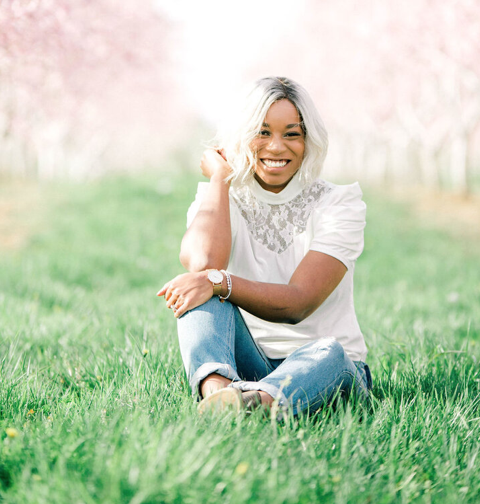
The current political climate has really cast a spotlight on diversity and equality in all aspects of our lives, including the wedding industry. On June 4, our editor, Amy Bielby, went live on instagram with wedding planner Beth Olatunji (Beth Jacobs Weddings & Events) to have an open discussion on this topic. Here are some highlights:
Beth Olatunji: Black Lives Matter is trending right now. It’s great because it’s bringing attention to a large problem that we face every day. But Black Lives Matter is not a trend to black people. Black Lives Matter is our life and how we’re treated differently every step of the way of life. And when we’re not treated differently it’s like, “Oh! They were so nice. That was awesome!” Why is it that I’m so overwhelmed with relief when I’m not prejudiced or stereotyped or held down? It’s so much deeper than Black Lives Matter for George Floyd, even though he was the catalyst to this movement. What happened to him is inexcusable and now it has shone a light on everyone who’s been screaming, “It’s not fair.”
Amy Bielby, Today’s Bride: You touched on how you have felt racism in this industry and how sometimes people make you feel like you don’t belong. Do you want to explain some things in the industry that you’ve come across?
Beth: I’ve walked into a venue with a client to do a sight visit and the venue coordinator was like “Oh! You’re the planner… No way.”
Amy: How did you respond to that? How can you possibly even respond to that?
Beth: I have to not be easily triggered and that does come with experiencing it all the time. But inside I was thinking, “I want to go back to my car to cry this out for a minute and come back.” But I can’t, so I have to push through it. You are talked down to in front of clients and I’ve actually had clients step in and ask for them to stop, in which I was very grateful for. I was also really embarrassed because I don’t think about the colour of my skin when I’m working until someone makes me think about the colour of my skin. I want to say they are not doing it on purpose and are just so surprised that this non-black client has a black planner, but the surprise is the problem. Why is it so surprising that this person hired me? What if I’m qualified to do this job? That is why people hire me.
Amy: You also mentioned that you’ll find that some black vendors will only attract black clients since white clients won’t work with them because they think there’s a trend that they only work with black couples.
Beth: It’s one of those things where you get bottlenecked into a certain demographic. A black vendor is attracting black clientele likely because when they started out their business, they probably got friends and family referrals who are of the same community. But what happens is, when a non-black client falls on that page, all they see is pictures of black people and are immediately disconnected.
Amy: As if that affects how someone makes a cake or takes a photo.
Beth: Exactly. Are you not connecting with the aesthetic of the design of the event? Or are you not connecting with the fact that everybody you see is black? That’s the problem. Because of that, they only attract one demographic of people. It’s why people are so confused as to how to diversify their portfolio, because no one will give them the opportunities to do it. People that work in this industry are in this industry because they love ‘love’. If we love to express love and help people do such a beautiful thing, why is love taken out of the equation when you’re finding your vendor?
Amy: That was a top priority for me when I took over Today’s Bride. I wanted to make sure our readers saw themselves in our magazine, in any way. You had said, it’s not even about having people of colour in your shoots. It’s about working with vendors too.
Beth: So many of us so quickly work with vendors who are not the same colour as us because we don’t care. We are looking for equality and we want people to feel the same. If it’s about featuring the work and if it’s inspirational and the photography is on point and it’s something new, then run it. Who cares what I look like or what my last name is? I love that there is that space in Today’s Bride to express different cultures.
Amy: I want to know how you feel about Black Lives Matter being a trend with #blackouttuesday and then everyone going back to normal the next day. We can’t let the movement just be on one day.
Beth: I think that is a huge problem. I do appreciate the sentiment. But it’s like when you pass a homeless person on the street and give them 5 bucks and keep moving. It’s like that was your good deed for the day. Posting a picture of a black screen was a great and powerful thing to do. But is that the only thing you’re doing about this problem?
Amy: Today I saw people being called out and it made me question myself. I feel really proud of the content we put out, but what action am I taking? I needed an action. That’s when we started talking and planned to have a conversation about it in front of our colleagues and our industry.
Beth: I think the biggest issue right now is making people aware of the things they’re doing that have impact, that they don’t even realize they’re doing. How do you expect me as a vendor to come into a venue and be treated like I’m incompetent but then turn around and kill it at the wedding the next day? I have to put on a brave face when people are treating me less than worthy of where I stand. You want to go out of your way to prove them wrong and work that much harder. That’s what this whole thing is about: changing the norm. We feel pain that nobody cares about because it’s considered normal. And in an industry where we are to celebrate love and help create these moments of a lifetime, it shouldn’t happen.
Amy: I would like to hear you speak about styled shoots with people of colour and how they are harder to get accepted.
Beth: Not every magazine is going to publish you based on merit. They are going to based on their aesthetic. I had someone say to me recently that they had a very qualified model do a styled shoot that was very well thought out and detailed. Normally, 7 or 8 blogs would pick it up but this time it was, “Sorry, your model looks too aggressive.” What does that mean? What is it that I or anyone can do to break that stereotype? It’s unfortunate because it almost starts a cycle where you have put us in this aggressive bubble and not deemed us appropriate to collaborate with because you assume we are going to be aggressive. Which makes me mad which makes me come off as aggressive. You are making it so easy for me to call you out, but I can’t because then I’ll seem like an angry black woman. You’re stuck to fit their aesthetic or stay out of their world.
Amy: When it comes to real weddings being submitted to us, we tend to get a lot of white couples. Do you have any suggestions for me? What should I do? Or other bridal magazines?
Beth: There should be a call from all bridal magazines that says we would love to see something cultural, colourful, or of a different country, so that people feel more comfortable to submit those out-of-the-box things that normally wouldn’t be published. We just submit our stuff to people who look like us because we know they’ve already accepted us for what we look like and who we are. We pass that hurdle and they can judge us solely on our work. So, I think it comes down to not knowing that it is welcomed for us to submit. Being more open about looking for diversity in your submissions is important.
Amy: So where do we go from here?
Beth: I would hope this is no longer just a trend. I hope it’s ongoing. I think that’s only going to be determined with time. We are still going to go out of our way to build our businesses and work hard to put forth quality. And then it just comes down to, are we going to have the opportunities? Not every submission gets accepted, that’s life. But if something is not accepted because the model was black, or the vendors were black, that’s the problem.
Amy: What do you want vendors in the industry to walk away with today?
Beth: I think I can speak for many when I say, just treat me like everybody else. I don’t care about preferential treatment. I don’t want to be treated better out of pity. I don’t want to be treated better because of a trend. I just want you to look at each vendor based on their merit and their aesthetic, with colour aside. Because we will never make our way anywhere if nobody will let us in.
Check out these styled shoots from Beth Jacobs Weddings & Events:
Cotton Candy Cuteness
Sweet Surrender









Leave a Reply